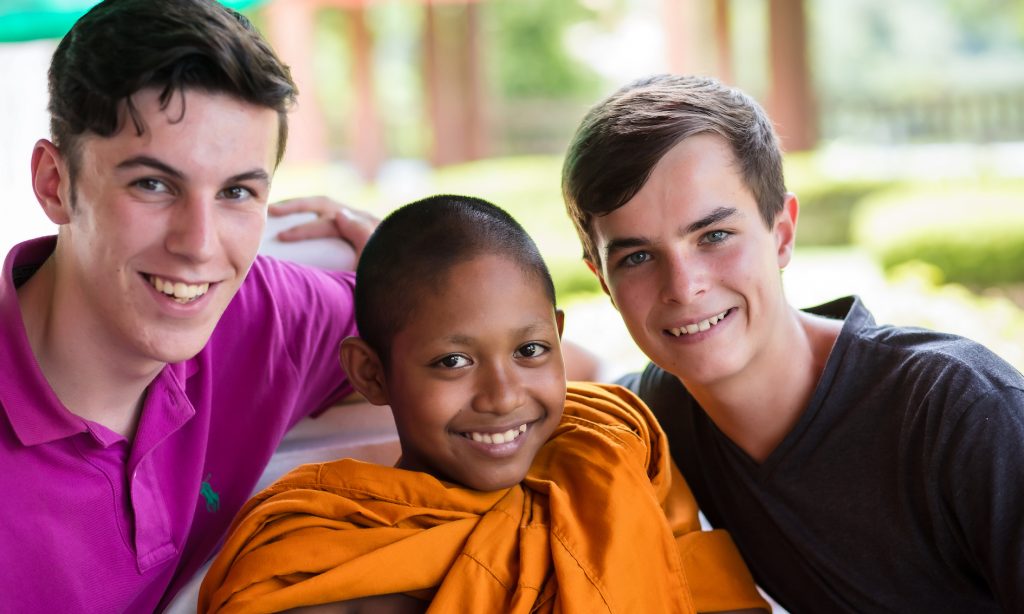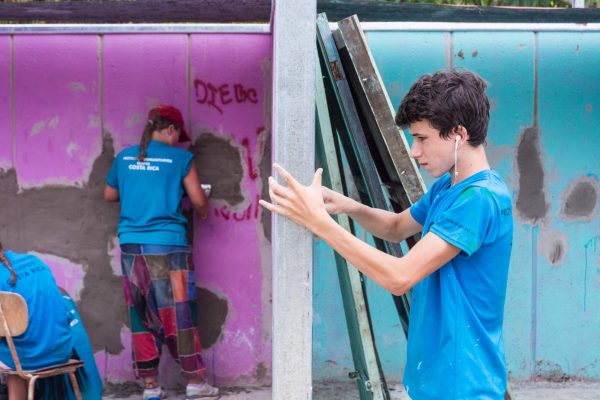SERVICE learning, within or alongside the curriculum, can be effective in supporting the development of active and informed citizens with ethics, integrity, responsibility, humility and a broader awareness of global inequities. Many Australian schools have a service learning program offering students opportunities to contribute to communities, both locally and internationally.
In today’s modern, fast-paced world, it is easy for young people to get caught up in their own lives; friends, family, work, sports, social media and schooling. Equally, as we progress towards an unpredictable future, with a continually evolving employment landscape, new skills are being identified as future currency.
Providing rich opportunities for young people to step outside of their daily routines, challenge their ideologies of social constructs, widen their global perspectives and develop these essential 21st century skills, is more important than ever.
Below we discuss four considerations relevant to developing service learning tours of the future.
-
Skills of the heart: Humans are better at being human
The January 2020 Deloitte report The Path to Prosperity: Why the Future of Work is Human, reveals human skills, rather than occupations or qualifications, are the job currencies of the future. The report states that although the shift from routine manual labour jobs to cognitive task jobs will continue, another employment trend is emerging. Interacting with others, being creative, using empathy, understanding and reacting to emotion, are fundamental ‘soft’ or ‘human’ skills that will bring the greatest benefits to society in the future. In alignment with this notion, ‘skills of the heart’ (jobs requiring a human touch) are driving future job growth faster than any other. These inherently human skills are vital because they are not easily imitated by automation. As put by Deloitte “humans are still better at being human”.
The Australian Curriculum calls schools to “equip students in recognising and regulating emotions, developing empathy for others and understanding relationships, establishing and building positive relationships, making responsible decisions, working effectively in teams, handling challenging situations constructively and developing leadership skills”.
Consequently, schools play a defining role in establishing the values that enable positive human interaction. It is essential that schools provide significant opportunities for young people to develop these human-centric skills, alongside ‘technical’ skills.
Educators should consider the level to which a quality service learning program can foster and facilitate the advanced development of skills of the heart. A service learning program that places students temporarily in the life of a child not dissimilar to themselves, yet from the developing world, can promote self-reflection and deep, personal growth in emotional intelligence, humility, gratitude and empathy. Such programs may include aiding the reduction of malnutrition in developing countries, facilitating computer literacy education in underprivileged communities or promoting the importance of education where it may be seen as a luxury as opposed to a necessity.
By encouraging students to develop skills of the heart, schools are ensuring that not only will their students have the appropriate proficiencies to succeed in their forthcoming careers, but that society will have an adequately skilled workforce which is mentally and emotionally equipped for tomorrow.
-
Active global citizenship: A passport to the future
The UK Oxfam Curriculum for Global Citizenship defines a ‘global citizen’ as someone who “is aware of the wider world and has a sense of their own role as a world citizen, respects and values diversity, has an understanding of how the world works economically, politically, socially, culturally, technologically and environmentally, is outraged by social injustice, is willing to act to make the world a more equitable and sustainable place, participates in and contributes to the community at a range of levels from the local to the global” (1997, p. 1).
This definition implies that in order to be global citizens, not only do young people need to experience and demonstrate empathy, but they must show some level of ‘outrage’, which will in turn drive their motivation to both advocate for, and take steps towards, positive global change.
A service learning tour can fast-track students’ understanding of key economic, social, cultural and environmental issues, allowing them to take one step closer to becoming true global citizens. Young people can further their global understanding of international issues, including social injustices, and discover that they can make a difference on a global scale. While any overseas experience may leave a lasting positive effect, the inclusion of genuine service learning activities – at a minimum – will improve global competence.
-
Transformational travel: finding purpose, values and setting goals
A service learning experience should inspire a sense of adventure in young travellers, taking them to foreign lands with unfamiliar landscapes, culture, language and people. It is in these situations, students have their comfort zones stretched, boundaries redrawn, and perspectives shifted. This is the ideal environment conducive for significant, personal transformation to occur.
The Transformational Travel Council, founded in 2016, defines transformational travel as “intentionally travelling to stretch, learn and grow into new ways of being and engaging with the world”.
Supporting students in identifying their personal development goals prior to departure, and then engaging with them in personal reflection during and after the program, promotes a more intentional and measurable experience. At the end of the program, students can evaluate whether they reached or exceeded their goals. With the support of their teacher, they can then consider how this impacts future goal setting.
Ultimately, transformational travel can result in young people carrying their learning home, positively impacting local communities and supporting more purposeful decision making, as they progress into adulthood.
-
Self-efficacy: leadership competence for tomorrow
In the 1994 article Self-Efficacy by Albert Bandura of Stanford University, self-efficacy is defined as “people’s beliefs about their capabilities to produce designated levels of performance that exercise influence over events that affect their lives. Self-efficacy beliefs determine how people feel, think, motivate themselves and behave”.
In the context of young people, self-efficacy is the confidence in their ability to successfully accomplish a given task. Learners who do not believe they have the ability to successfully complete tasks, will often avoid situations where there is a potential to fail. A well-structured overseas service learning program should present opportunities for young people to be confronted with significant real-world problems to address and work through. Confronting these unique challenges can generate considerable learning outcomes, including an increase in self-efficacy and resilience.
Interestingly, as stated by Bandura in Self-Efficacy (1994), another process to create and strengthen self-beliefs of efficacy is through “the vicarious experiences provided by social models. Seeing people similar to oneself succeed by sustained effort raises observers’ beliefs that they too possess the capabilities to master comparable activities required to succeed”. In the context of service learning, young people who observe their peers succeeding in the physical, emotional and cognitive challenges (with which they will be presented), will experience an increase in their own self-efficacy. This is further reinforced by witnessing the change and significant impact that their efforts are having on the local community.
Through actively considering how skills of the heart, global citizenship, transformative travel and self-efficacy are incorporated into service learning programs, educators can ensure that program outcomes are well defined and measured. With positive life experiences, a framework of self-belief and global ideologies at their core, young people who participate in these considered service learning programs, will be better prepared for future successes.
To find out more about our overseas service learning tours, please click here.



